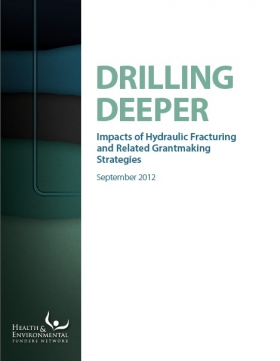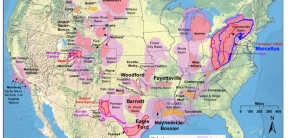If the entire environmental health and justice community were on Twitter, we’re certain hydraulic fracturing, or fracking, would be a “trending topic” these days – and rightfully so.* New techniques for extraction have made it possible to reach previously inaccessible deposits of oil and gas, through intensive processes known as fracking. This has led to dramatic increases in U.S. natural gas drilling. Though it’s not simply the fracking activity that has people talking; the speed of development, range of impacts and complexity of the issue are keeping fracking front and center.
Fracking has grown significantly in the last decade for several reasons. The promises of economic prosperity combined with exemptions from federal environmental protection laws have set up friendly conditions for natural gas companies to expand drilling. Furthermore, natural gas has been championed as a cleaner alternative to other fossil fuel energy sources because of its lower carbon emissions in combustion. Yet many worry communities will rush to open drilling without thoughtful consideration of the health, environmental and social impacts of fracking.
Communities’ experiencing drilling impacts are also driving discussion about fracking. Reports linking fracking activity to groundwater contamination, air pollution, wildlife endangerment, strained social services and infrastructure, infringement on individuals’ rights and even earthquakes are growing. Additionally, concerns about methane leakage from gas extraction have led to questions about natural gas’ lifecycle carbon emissions and its place in transitioning to a cleaner energy future.
The swift expansion of fracking and its varied impacts have demonstrated just how complex this issue is. Fortunately, grantmakers are uniquely suited to help shed light on these complexities and to support better informed policy, practices and public opinion.
In response to growing funder interest, HEFN has published a new report: Drilling Deeper: Impacts of Hydraulic Fracturing and Related Grantmaking Strategies. Authored by Michael Passoff, a consultant to foundations and non-profits,the report provides funders with an outline of concerns surrounding fracking methods and presents funding strategies being considered or implemented. It is a must read for grantmakers across interest areas looking to better understand concerns about fracking and the ways philanthropy can address them. Read the report here.
HEFN also offers funders concerned about fracking and its impacts a platform to learn, share information and explore collaboration through the Hydrofracking Working Group. To hear more about the group, please e-mail hefn@hefn.org.
Drilling Deeper was made possible by the generous support of members of HEFN’s Hydrofracking Working Group. *A “trending topic” is a phrase used on Twitter to signify a popular subject Twitter users are discussing in real-time.


